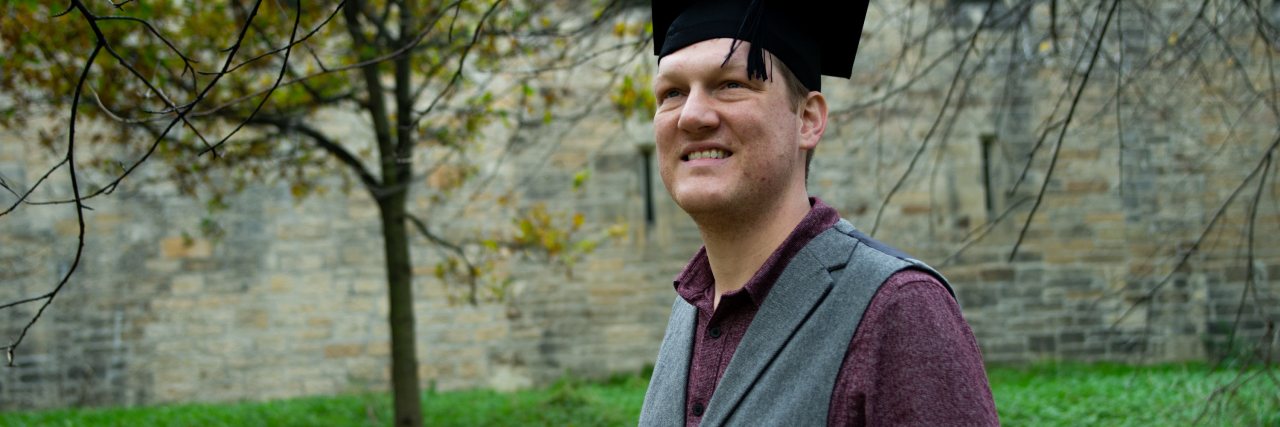How a Chance Comment to My Psychiatrist Led to My Bipolar Diagnosis
Editor's Note
Please see a doctor before starting or stopping a medication.
I was diagnosed with bipolar disorder last year by accident after a comment to my psychiatrist about taking antidepressants, so I wanted to share my story in solidarity of the 1.3 million people in the United Kingdom who have bipolar disorder, and to the many more out there who remain undiagnosed.
I was sitting in the psychiatrist’s office. He looked nice; expensive shoes, curly hair, Irish accent. He was a psychiatrist you’d see in an HBO drama; having paid privately for the assessment, I thought, “you get what you pay for.” Only I wasn’t thinking that. I wasn’t thinking anything; my brain had been like television static for months.
He rattled through some questionnaire, asking questions about my family’s mental health, if I was a substance user, had ever attempted suicide.
I can pinpoint the moment I finally broke down and admitted to myself I needed help. It was another Sunday where I’d spend most of the day under the covers, crying constantly — ugly, animalistic crying. I thought, “if only I work harder at my job, I’ll feel better; if I meditate more, take more vitamin C, exercise more, this living nightmare would cease.” A horrible dawning realization came over me; I’d spent a great deal of my adult life pushing myself, filling every hour.
When COVID-19 lockdown was announced, I’d switched from actor and performer to support worker overnight. These seismic changes were very “normal” for me. I put in 15-hour shifts most of the week, cycling the 10-miles to and from work, and still feeling like I could do more. I saw nothing strange in this. Before I truly accepted I was unwell, all I wanted was to get back to that constant pressured work depression got in the way of.
Because for most of my adult life, I’d been told I had depression and anxiety — maybe at a pinch, a personality disorder — but for the most part, GPs and psychiatrists tried me on a variety of SSRIs.
I’d come off one earlier in the year, and all my brain was showing me was a ticker-tape of lifelong “failure.” The looks of shock on people’s faces when I’d rant at them for dropping a sugar-bowl, going missing for the odd week, ending up in a strangers bed after three days without sleep, suddenly thinking it’s a great idea to throw all my belongings away. This strange alienating behavior I hid from myself in a cloud of mania.
“When did you first take antidepressants?” the psychiatrist asked.
“When I was 12, but they stopped it because I became really hyper on them. Later, I was put on a tricyclic, that seemed to work really well, I had this frenzy of self-belief on that, but I stopped when I went to university, and I spiraled down, had a lot of anxiety and depression.” I replied in garbled, confused sentences, choking back tears long enough to get my words out.
It was when I mentioned my anti-antidepressant sentiments that he dropped his biro and made eye contact. It was as if something had just clicked for him.
“I think I know what this is, it’s bipolar.”
I let out a long tearful exhalation. I was expecting anything but that. I was astounded by his confidence. His tone was annoyed in a compassionate way, as if to mean, “why hasn’t this been spotted before? It’s so obvious.” I had detailed a life of highs and lows, deep anxiety, ruined jobs, relationships, reckless behavior without thinking that was part of a mental illness. Despite knowing about the lives of Virginia Woolf and Stephen Fry, I hadn’t connected a single dot.
“How do you know?”
“It’s the antidepressants. You said that you felt that you could do so much more on them; what was in fact happening was you were triggering multiple hypomanic episodes. That’s why you were experiencing these episodes with such regularity.”
“And I could have had this since I was a child?”
“Yes. Now I am going to recommend an antipsychotic. We’ll start you off on a small dose and build you up, I’ve seen it work miracles.”
And like that, I was out the door.
It’s been nearly four months since my diagnosis of bipolar type 2, and my life has changed so much. Don’t get me wrong, it was hell. Luckily I have a very supportive husband, who effectively had to care for me whilst my brain finally adjusted to regular levels of dopamine. A brand new reality was finally dawning. Not only did the pills help, I’ve also got a counselor who tells me the golden phrase which is a key to many people’s recovery — “self-compassion.”
The narrative of my life has reshaped around this diagnosis, not one of failure, but one of determination in the face of misdiagnosis, misunderstanding (by myself and others) and denial. I know my life going forward has to be one of careful management, but it can be done. I wanted to share this because I’d got the age of 33 thinking I had depression and anxiety, and the very medication I was using was exacerbating my condition to the point of torture. Yet, it was these same drugs that led to my diagnosis, and if this story helps one person to be diagnosed, to feel less alone, to get help, to realize that the hell inside them is not their fault, then it will be worth it.
Image via contributor

